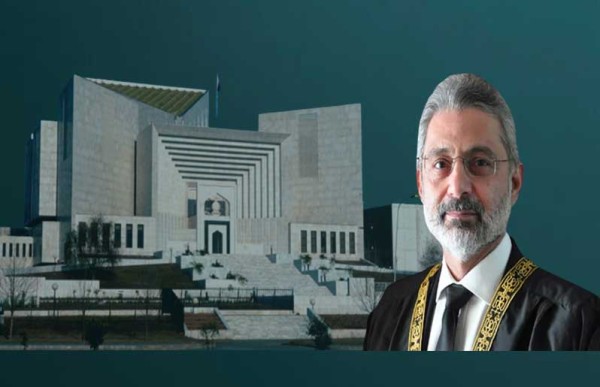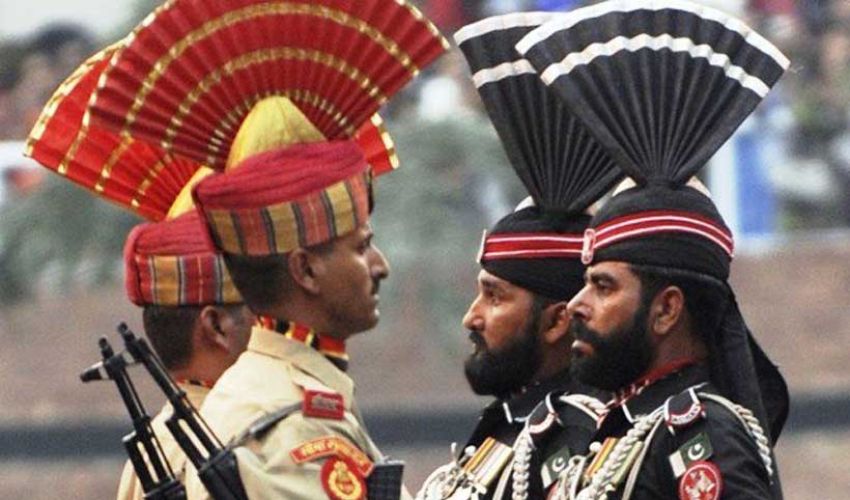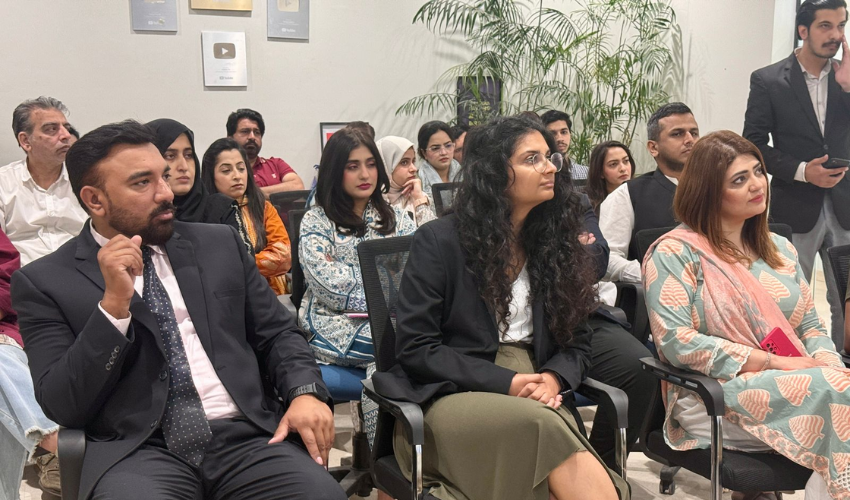The Supreme Court on Wednesday dismissed the petitions against the Practice and Procedure Act, and sustained the law with a majority of 10-5.
A full court bench comprising 15 judges, head by Chief Justice of Pakistan Qazi Faez Isa, pronounced the judgement that was reserved earlier in the day after five consecutive hearings. The law was deemed in accordance with the Constitution.
According to the verdict, the right to appeal will not apply retroactively. The clause seeking application of the right to appeal on past decisions has been voided with 8-7 majority, while the chief justice dissented from the decision.
The right to appeal in decisions of suo motu cases under Article 184(3) has been sustained with a 6-9 majority.
Justice Ijazul Ahsan, Justice Mazahar Naqvi, Justice Muneeb Akhtar, Justice Ayesha Malik were among the dissenters of the 10-5 verdict.
With this decision, the Supreme Court (Practice and Procedure) Act stands enforced.
The Supreme Court had reserved its decision on the applications against the Practice and Procedure Act. Chief justice of Pakistan (CJP) Qazi Faez Isa said if a consensus is reached, the verdict will be pronounced, otherwise it will be reserved.
The Supreme Court has resumed the hearing of multiple petitions against the Practice and Procedure Act for the fourth consecutive day. A full court bench of the Supreme Court, headed by Chief Justice of Pakistan (CJP) Justice Qazi Faez Isa, is hearing the petitions.
On Tuesday, the MQM and Pakistan Bar Council had announced their support for the Practice and Procedure Act.
Under Article 175, legislation regarding the Supreme Court is not possible, petitioner’s counsel Hassan Irfan remarked.
Justice Jamal Mandokhel said if the law sustained the full court could amend rules. Justice Ayesha Malik said the full court rules could also not be made outside the law.
Beginning his arguments, Attorney General for Pakistan Mansoor Usman Awan said he would take about Article 191 and the independence of the judiciary.
He further said the Constitution mentions “subject to law” at various places, adding the right to privacy is also kept subject to law. Article 191 does not take away the right of parliament to legislate, he argued.
Parliament has given independence to the judiciary but has not rescinded its right to legislate, the AGP added.
There has been no amendment to Article 191 since the Constitution was made, he commented, adding that not amending Article 191 was to ensure the independence of the judiciary.
He further said that the right to legislation in the high treason and Right to Information laws was derived from constitutional provisions.
If parliament did nothing under Article 191 since 1973, it could mean that it accepted that the article did not allow for further legislation, Justice Muneeb Akhtar remarked.
Justice Athar Minallah told the AGP that Article 191 did not just say law, but “subject to law”.
The chief justice of Pakistan said subject to law could also mean judgement law. Maybe parliament maintained these words this way for further legislation.
Wherever this was the intention of parliament, this further legislative power has been clarified, Justice Ijazul Ahsan remarked, adding if this was the intention of parliament in Article 191 also, it would have said so.
The AGP responded that the term "law" in Article 191 was not related to the 1956 Rules. Justice Muneeb Akhtar asked if the Supreme Court rules made in 1980 be called the current law. AGP Awan responded in the negative.
Justice Ayesha Malik asked Awan if he was saying that the rules have the status of law but under Article 191 this isn’t law.
Justice Muhammad Ali Mazhar asked if after the formation of the Supreme Court rules the word “law” in Article 191 ceases to exist. The AGP said Article 191 does not place any bar on parliament for amendments.
“You are saying that there is no restriction on parliament to make amendments under the rules made by the Supreme Court?” Justice Ahsan questioned, asking further if there is also no restriction on amendments made by the Supreme Court in the law made by parliament.
The law-making body is parliament, the AGP responded.
'Supreme Court is like Titanic..'
Justice Yahya Afridi raised questions over the Practice and Procedure law, saying whatever the problem was should have been fixed by parliament.
“Parliament's problem in the Act was to create a mechanism related to suo motu notice or Article 184(3),” the judge remarked, adding that parliament has made judges' committee for all kinds of cases out of the suo motu cases.
“The entire Supreme Court is like a Titanic; it is not right for parliament to re-organise everything all of a sudden,” Justice Afridi said, adding that there should have been a mechanism for parliament’s use of powers.
“If there are mistakes in the Supreme Court, they are there with parliament too,” the judge commented.
One institution should respect the other, the CJP interjected, adding that he thought parliament had respected the Supreme Court. “Now we’ll see maybe there is a need to make further rules,” he added.
The CJP further commented that the scope of the issue should not be expanded, adding parliament is not an enemy nor does it consider the court its enemy. One institution should not clash with another, he maintained. “The world is moving ahead, and we’re going backwards,” CJP Isa commented.
He said he was associated with the legal profession for 40 years, if there was anything wrong they’ll see what to do.
No matter how many types of laws there are, the matter ends if there is an Act of parliament, Justice Shah remarked.
If the rules and Acts of parliament are both laws, will these two laws not clash, asked Justice Ahsan.
The Supreme Court has been given the authority to make rules for the implementation of the Constitution, Justice Jamal Mandokhel said, asking what will happen if they did not follow the Act.
The AGP responded that the judges are bound to implement it under their oaths.
The Constitution does not recognize the chief justice as the master of roster, the AGP said.
Justice Akhtar asked if according to this Act, the master of roster is a committee of three judges, adding that making rules is the prerogative of a full court, but it has been confined to a three-member committee.
'Live and let live'
Justice Ahsan told the AGP to present the government’s stance whether the implementation of the law is mandatory or not. Awan said it was mandatory.
“Why should negative things be linked to parliament?” asked the CJP. “Live and let live. Don’t pitch institutions against each other.”
AGP Awan said the tradition of laws also has been recognized in the Constitution. To this, Justice Akhtar remarked that constitutional traditions are recognized in every country where there is a written Constitution, adding that if there is a contradiction between the constitutional and legal traditions, the constitutional tradition take precedence.
Under Article 189, there is no obligation to obey traditions, CJP Isa commented.
Justice Akhtar also remarked that the master of roster committee will perform the same functions as the chief justice does, asking if the powers do not have to be given to one judge then why to three?
“If 14 judges cannot be left at the mercy of one judge, then how can 12 be left to the mercy of three?” he questioned.
The burden of proving that the provisions of the Act are unconstitutional lies with the petitioners, the CJP said.
The AGP then said parliament can legislate directly to extend the jurisdiction of the Supreme Court. Justice Shah remarked that parliament can expand the powers of the Supreme Court, not reduce or eliminate them.
“It seems you didn't quite like the question I asked,” the CJP remarked, adding, “We are identifying mistakes in the authority of another institution.”
This Supreme Court did what was not within its power, he said further, adding that one bench gave a decision and the other gave its own verdict on it. "No petitioner had the courage to talk about this," Justice Isa said.
"Enough of this drama that parliament cannot do this!" he stressed.
That was not even the jurisdiction of the review, CJP Isa said, adding that if a finger has to be pointed, it should be pointed at one’s own self first.
“Can the Supreme Court expand its jurisdiction if parliament cannot?” he asked. The AGP responded in the negative.
He further said that the only question before them was whether the Practice and Procedure Act was constitutional or not. If it became unconstitutional, it will not remain maintained, he added.
“Honour parliament so it follows our decisions,” CJP Isa said, adding that there could be debate on whether the law is good or bad.
How are the provisions of the Practice and Procedure Act not inconsistent with the Constitution, Justice Ahsan asked.
Decisions were made by moving the bench here and there. Was that correct? Asked the chief justice, adding judges were also barred from hearing certain cases. “Was it right to change decisions by moving benches of the Supreme Court?” he asked.
The chief justice questioned why judges were afraid of hearing the truth or listening to criticism. “I will not have a problem if you show me the mirror,” he remarked.
'Full court a mistake'
The powers of the Supreme Court can be increased by parliament, but not reduced, the AGP argued. Justice Afridi asked that if once the court’s powers are expanded, can the Act not be repealed. The AGP replied that the ambit of Article 184 or 185 can be extended by parliament.
Justice Muhammad Ali Mazhar asked if there were any limits to parliament’s expansion of the powers of the Supreme Court.
"Let me admit that I made a mistake by forming a full court," CJP Isa said, adding that however, none of his colleagues objected to the decision.
“Even when the first eight-member bench was formed, there was no objection,” he said, suggesting forgetting about assumptions and completing arguments.
“Sorry, but these are not assumptions,” Justice Muneeb Akhtar remarked.
'Don't promote dictatorship'
Justice Malik said the law gave the right to appeal in cases under Article 184(3).
Where will the appeal against the case being heard go, asked the CJP, adding the law says there will be right to appeal in some cases. Justice Malik asked to read what the law says.
The law gives the right to appeal in cases under Article 184(3), adding that if the court forms a full court to hear a case, the appeal cannot go anywhere. She also asked if the SC could eliminate the right to appeal given in the law through a full court.
At the end of the hearing, Justice Sardar Tariq Masood remarked that a chief justice approves an unconstitutional move by forming a bench and there is no objection to it. Even the holy Quran talks about consultation, he added.
“You say dictatorship is right; are we slaves?” Justice Masood said, adding that this was about the future and asked not to promote dictatorship.
“Four dictators came, the last one was Musharraf. Let this country run,” the judge said, adding that at least say that it was a well-made law.



























